#persian poetry
Text
"Attar is one of the greatest poets of the Persian language. Nonetheless, his popularity - both in Iran itself and in the West (Goethe, for example, touched on him only briefly in his West-Eastern Divan) - does not match that of Ferdowsi (d. 1020), Omar Khayyam (d. c.1132), Rumi, Saadi (d. 1292) or Hafiz (d. 1389); occasionally he is even omitted from the line of seven Persian poet-princes in favour of Jami (d. 1492). One possible reason for this is that the composition of his poetry is too artful, too complex to be effective in the town squares and teahouses, while at the same time, many of his stories and figures may seem too coarse, too folk-like and too sarcastic to be at the forefront of the high spiritual literature cultivated at courts in former times and in middle-class households today. Attar’s poetry, on the other hand, is far less stilted than that of most Persian poets but, rather, unadorned, clear and immediate. The pain it expresses is not spiritually filtered as in Rumi, far less metaphysically elevated than in Saadi, and not sublimated into pleasure as in Omar Khayyam - where Hafiz turns the earthly into the mystical, Attar strips mysticism down to its leaden, earthly foundation in order to scream his longing to the heavens."
--Navid Kermani, The Terror of God: Attar, Job and the Metaphysical Revolt
.
I asked my professor which masnavi (Persian epic poem) he thinks is the greatest ever written. He replied, Rumi's Masnavi (the only masnavi Rumi wrote). Shock. How can there be a masnavi greater than Attar's Conference of the Birds? (There are 4 authentic Attar masnavis; sadly, as far as I know, Conference of the Birds is the only one that has been translated into English.) Reading through Rumi's masnavi I think I am still team Attar. It's Attar's coarseness I love--he is a poet of mad saints and freaks. In Rumi's Masnavi, the absence of a frame story and the pious/didactic tone is somewhat of a barrier for me. The pieces don't quite hang together, whereas Attar's Conference of the Birds is intricately structured--there are stories within stories within stories, each bird with its idiosyncratic psychology--a narrative arc that mirrors the journey of the soul across the seven valleys. But maybe there is a difference between reading a sufi text for its poetry rather than religious instruction, I don't know.
#attar#Rumi#persian poetry#poetry#literature#masnavi#Navid Kermani#islam#islamic mysticism#islamic literature#mysticism#sufism#sufi literature
184 notes
·
View notes
Text
دے رہے ہیں لوگ میرے دل پہ دستک بار بار، دل مگر یہ کہہ رہا ہے صرف تو اور صرف تو
De rahe hain log mere dil pe dastak bar bar, dil magar yeh keh raha hai sirf Tu aur sirf Tu
— Fariha Naqvi فریحہ نقوی

#urdu#urdu poetry#urdublr#urdu posts#urdushayari#shayari#urdu stuff#urdu ghazal#Fariha naqvi#forough farrokhzad#persian poetry#poetry#poetry collection#tumblr poetry
258 notes
·
View notes
Text
Seek the wisdom that will untie your knot. Seek the path that demands your whole being.
— Rumi (Jalāl al-Dīn Muḥammad Rūmī), translated by Maryam Mafi in 'Hidden Music'
#rumi quotes#rumiquotes#mystical teachers#persian poetry#enlightenment#quotes#spiritual journey#wisdom#mystic poets
197 notes
·
View notes
Text
A Persian Poem:
“Zendagi az tu, marg az man. Rahaati az tu, narahaati az man. Khushi az tu, ghaam az man. Hama chiz az tu. Wale tu az man.”
translation: “Life is yours, death is mine. Peace is yours, stress is mine. Happiness is yours, sorrow is mine. Everything is yours, But you are mine.”
#persian poetry#dark academia#literature#poetry#quotes#poem#light academia#romance#romantic academia#love quotes#memes
1K notes
·
View notes
Text


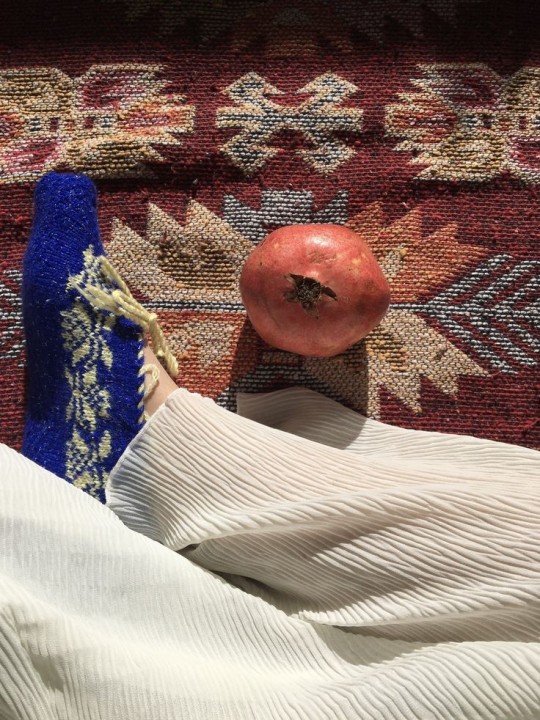

Forough Farrokhzad poetry for today
#persian literature#persian poetry#iranian cinema#modern poetry#forough farrokhzad#mahmoud darwish#foreign languages#poetry by women#poems by women#writers of color#web weaving#text post#contemporary literature#litblr#contemporary poetry#sylvia plath#joan didion#virginia woolf#farsi
70 notes
·
View notes
Text
Mun tu shudam tu mun shudi
mun tu shudam tu jaan shudi
Taakas na guyad baad azeen
mun deegaram tu deegri
I have become you, and you me,
I am the body, you soul;
So that no one can say hereafter,
That you are someone, and me someone else.
-Ameer Khusrau,Sufi saint
#from shoaib's diary#iran#urdu lines#persian poetry#desiblr#urdu poetry#urdu literature#urdu shayari#urdu aesthetic#desi academia#urdu stuff#desi aesthetic#desi tumblr#iranian drama#iranian#poetry#poems and poetry#poetrycommunity#short poetry#spilled poetry#prose#words words words#poems on tumblr#poetic#arabic poetry#love poetry#poems#quotes of the day#quotes#shoaib ki diary se
56 notes
·
View notes
Text




گفتم که مرگ عاشقان ،
گفتا کہ درد ہجر من
گفتم کہ علاج زندگی
گفتا کہ دیدار منست
Guftam ke marg aashiqan,gufta ke dard hijr mann.
Guftam ke ilaj zindagi, gufta ke deedar mansat.
I asked what is the cruel death,
replied the pain of living without me
I asked what is a healthy life,
replied gazing at me.
#persian poetry#persian poem#amir khusro#persian art#poetry#persian aesthetic#aesthetic#urdu poems#desi girl#desi teen#desi tumblr#tumblr aesthetic#tumblr quotes#tumblr poetry#tumblr poet society#desi aesthetic#arabicaesthetic#urdu aesthetic#life quotes#urdu poetry#urduzone#urduadab#arabic quotes
44 notes
·
View notes
Text
عشقیست دَوارِ چَرخ، نَزْ آب
عشقیست مَسیرِ ماه، نَزْ پا
Love turns the wheel, not water, love carries the moon, not feet.
— Rumi
#rumiquotes#mevlana celaleddin rumi#rumi#rumic world#mevlana#jalaludinrumi#sufiquotes#sufimaster#sufism#persianwords#persian#persian poetry#فارسی#رومی#جلال الدين الرومي#صوفي
58 notes
·
View notes
Text
my heart shook intractably in my chest
from the entreaty of his imploring eyes

— Forough Farrokhzad
#forough farrokhzad#persian poetry#women writers#love poem#poetry blog#poetryblr#persian literature#mehreen khan#romantic academia#literat#desiblr
103 notes
·
View notes
Text
Reading some poetry by Rumi that he wrote to/about Shams… Remember, guys! All that gay stuff is just metaphors!
"I became his flute and started crying when his lips touched me. I was blindly searching for his hand while all the while he was holding mine."
Like I said… It's just a metaphor for friendship!
#Btw this is just one line of a very long poem#historians loves to tell us that this isn't gay meanwhile actively censor his gayest poetry.#seriously the first english translation of his most homoerotic poems was published in 2006!#Everyone knew they existed they just didnt translate it#rumi#shams tabrizi#persian poetry#ancient queer history
29 notes
·
View notes
Text
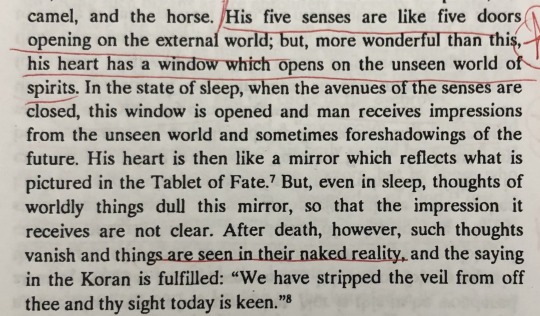
—Al-Ghazali on perception and dream divination, from The Alchemy of Happiness

Random notes on my Hallaj printout
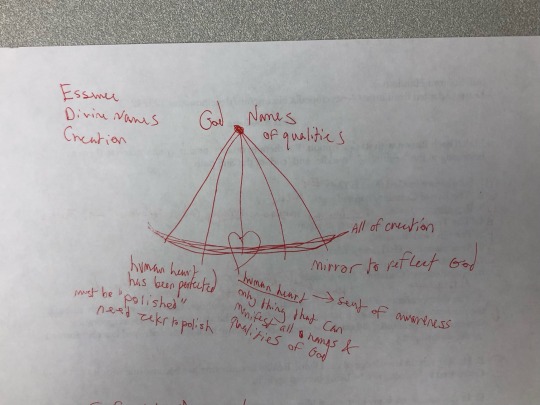
I’m immensely enjoying my Sufi literature class but it fills me with such grief. There is so much literature that has not been translated from Persian and Arabic into English. Even Ibn ‘Arabi’s magnum opus The Meccan Revelations has not been translated (well, it is like a trillion pages long). I could not even find a full translation of chapter 178 on love!
Attar has an untranslated text called The Book of Affliction. The professor of my class says, “It’s REALLY good.” It pains me that I can’t read it, but I’ve been hunting for snippets in the Anglophone scholarship on Attar. O how my heart burns to read this book!!



Attar mania.
#al ghazali#literature#poetry#persian poetry#arabic poetry#hallaj#sufism#Sufi literature#mysticism#islamic mysticism#islam#attar
74 notes
·
View notes
Text

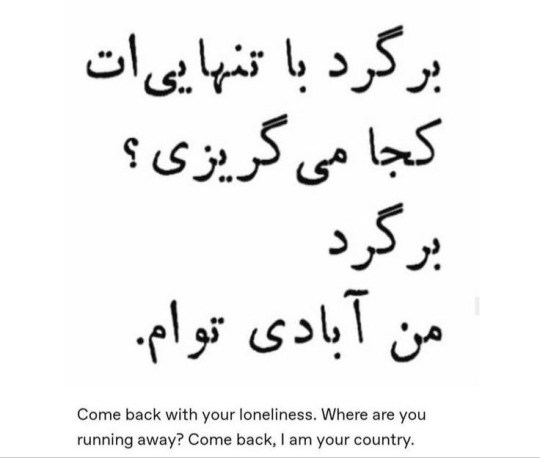

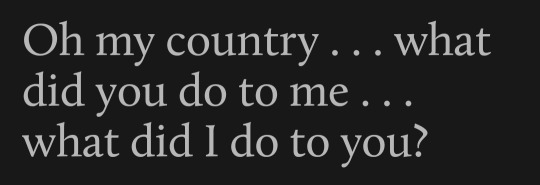
on love being your homeland
1. amy lowell, the fruit garden path 2. tumblr user @muhtesemz 3. raazi (2018), dir meghna gulzar 4. osama alomar, from "bag of the nation" (trans. c j collins) via @soracities
#being haunted#web weaves#web weaving#compilations#parallels*#mb#on country#on love being your homeland#on love#amy lowell#raazi#raazi (2018)#persian poetry#osama alomar#persian literature#literature#art#bookblr#writing#poetry#bollywood#dark academia quotes#dark academia#on grief#comparitives#ww#webs
191 notes
·
View notes
Text
The great Persian poet Hafez wrote, "Start seeing everything as God, but keep it a secret." I still have no idea what I mean when I say God, but I see it everywhere. I mean it intensely. I write poems and, yes, books about it. I read about it constantly, which seems, counterintuitively, to only deepen its secret. Close your eyes. Imagine in your head a bladeless knife with no handle. Do you see how the image recedes from view the more language I add to it? A bladeless knife. With no handle.
#kaveh akbar#poem#persian literature#persian poetry#god#love poem#romanticism#dark academism#dark acadamia quotes#dark academia#literature quotes#poetry#romantic literature
78 notes
·
View notes
Text
It’s our eyes that come and go
Gold, Rumi
#dark academia#rumi#literature#quotes#arabic poems#arabic quotes#urdu literature#persian poetry#life
38 notes
·
View notes
Text
آشتی خواهم داد، آشنا خواهم کرد، راه خواهم رفت، نور خواهم خورد، دوست خواهم داشت
I will reconcile, understand, walk on.
I will drink light.
I will love.
— Sohrab Sepehri, “A Message on its Way”
16 notes
·
View notes
Text

105 notes
·
View notes